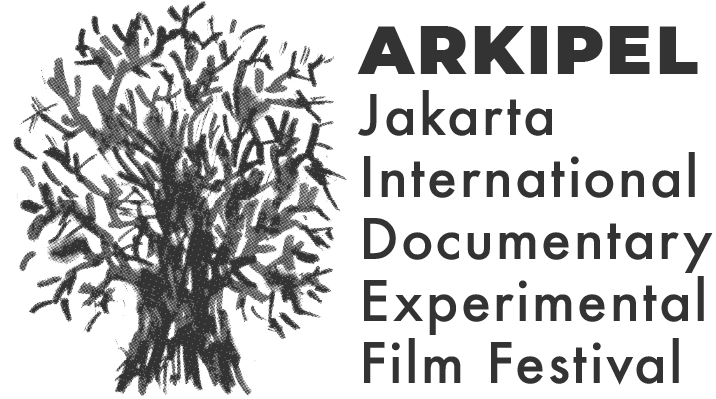OPEN SUBMISSION
ARKIPEL
Jakarta International Documentary & Experimental Film Festival
2023

Abad 19, jejaring intelektual yang dikatalisasi oleh perkembangan teknologi media menyulut reaksi berantai kebangkitan kekuatan-kekuatan baru yang menumbangkan kolonialisme. Media massa, roman, dan korespondensi antar benua melahirkan kesadaran akan kawan-kawan senasib seperjuangan. El demonio de las comparaciones (Iblis perbandingan) yang hinggap di para terpelajar negara-negara koloni setelah lawatannya ke Eropa membuat mereka mempertanyakan kembali bagaimana proses pembelajaran sebuah komunitas lepas dari “belas kasih” para penjajahnya. Maka, upaya pembangunan imajinasi baru itu muncul lewat berbagai proyek sastra, kebudayaan, konsolidasi politik hingga pemberontakan bersenjata berlandaskan kesadaran kebobrokan negara-negara kolonis, jejaring anarkisme global dan el saber popular atau yang akrab pada kita sebagai kearifan lokal. Keterpaduan pengetahuan lokal dan global itu memulai sebuah proses belajar baru yang mendefinisikan konstelasi baru dalam panorama struktur sosial dunia: Negara Dunia Ketiga.
Konteks tersebut menjadi penting jika kita melacak kondisi hari ini di mana garis demarkasi yang dibawa oleh kepentingan politis dan modernisme memotong proses belajar yang tidak sesuai dengan prinsip-prinsipnya. Pengetahuan-pengetahuan yang belum selesai itu terdeposit oleh tumpukan pengetahuan baru akibat kontestasi ideologi. Hutang para intelektual publik yang terlibat di dalamnya menjadikan kita tidak dapat merengkuh buah pengetahuan yang pasti. Beranjak dari kasus Indonesia, di mana perdebatan angkatan Balai Pustaka, 1945, 1966, yang mempersoalkan ke-Indonesia-an kerap terbajak sentuhan Tangan-tangan Besar yang selalu beradaptasi. Disrupsi terakhir yang “direngkuh sendiri”, Reformasi 1998, telah sampai seperempat abad tahun ini, tapi kelembaman sistemik dalam merawat proses belajar masih tetap menyisakan ambivalensi dalam proses “menjadi” sebuah unit kolektif.
Frasa Noli me Tangere (latin dari “jangan sentuh aku”) sebagai sebuah ungkapan performatif yang dikanonisasi kitab suci memberikan alegori yang relevan dalam melihat upaya disrupsi proses belajar. Berbagai tafsir atas penolakan enigmatik Yesus Kristus dari sentuhan Maria Magdalena pasca-kebangkitan-Nya menyulut keimanan atas konsep transformasi yang belum selesai (manusia→Tuhan, tubuh→ide). Sebagai sebuah ikon yang diturunkan pada seni rupa; sastra; dan pada akhirnya filem, proses referensi dan ikonoklastik bekerja secara bersamaan padanya. Frasa yang diniatkan menginspirasi ketakwaan di Barat, menemukan relevansinya pada ranah medis sebagai kanker yang apabila ditangani akan semakin bermultipikasi dan sakit. Istilah tersebut lantas digunakan secara revolusioner oleh Jose Rizal dalam buku seminalnya yang membedah pemakluman atas kolonialisme di Filipina sebagai kanker masyarakat. Berangkat dari kerja sastrawi Rizal, dalam semangat yang sama, Konferensi Bandung 1955 mengamplifikasi gema “Noli me tangere” modern dalam ungkapan Non-Blok di tengah kegentingan Perang Dingin. Interupsi pun berhasil dilayangkan padanya.
Indera peraba dari tubuh manusia yang menjelajahi tubuh lain dan ruang geografis yang penuh tekstur menjadi titik berangkat dari pencarian sastraik pasca pandemi yang membawa paradoks sentuhan. Dengan perkembangan intelegensi buatan yang mendemonstrasikan keberhasilannya sebagai pemotong proses belajar manusia, bagaimana sinema yang hari ini semakin menjadi ekstensi tubuh dapat mempertanyakan kembali upaya pembelajaran? Bagaimana sinema memberikan spekulasi atas temuan-temuan di celah Modernitas, yang dijadikan cara utama dalam mengetahui namun penuh tambal sulam?
Dalam edisi kesepuluhnya, ARKIPEL mencoba untuk berefleksi dari pembacaan kami atas praktik sinema dokumenter dan eksperimental dunia selama 10 tahun terakhir. Bagaimana kelindan tema, bentuk, moda produksi dan moda eksebisi, mampu menawarkan sensibilitas melampaui kerja representasi Modernisme. Perayaan ini bertepatan dengan 20 tahun kerja Forum Lenteng dalam menginvestigasi cara “mengetahui” yang bisa dibedah dengan kritisime sinema. Noli me Tangere menjadi pintu masuk untuk apa yang ditesiskan Otty Widasari dengan “penggubahan sastrawi kajian Barat dengan menyoroti dialek kontinum antara tubuh-tubuh tropis yang berdialog dengan pengetahuan Modern di atas lokasi yang memiliki kekhasannya masing-masing: menyoroti dengan seksama ‘kisah’ yang telah dihilangkan oleh garis demarkasi resmi.”
In the 19th century, intellectual networks catalyzed by the development of media technology were sparking a chain reaction of the emergence of new forces that overthrew colonialism. The mass media, literature, and intercontinental correspondence gave rise to awareness of comrades who share the same fate in arms. El demonio de las comparaciones (the devil of comparison) which perched on the intellectuals from the colonized countries after their visit to Europe, was triggering them to question again how the learning process of a society should be released from the “mercy” of the colonialists. Thus, the effort to bring about new imaginations emerged through various projects of literature, culture, political consolidation to armed uprisings, based on the awareness of the depravity of colonial powers, global anarchism networks and el saber popular or the local wisdom. The integration of local and global knowledge started a new learning process, defining a new constellation in the panorama of the world’s social structure: Third World Countries.
This context becomes important if we trace today’s conditions where the demarcation line brought by political interests and modernism cuts through learning processes that are inconsistent with their own principles. The unfinished knowledge is deposited by piles of new knowledge due to ideological contestation. The debts of the public intellectuals involved in it prevent us from embracing the definite fruit of knowledge. Based on the case of Indonesia, wherever debates happened amongst generation of Balai Pustaka, 1945, 1966, to question Indonesianness, was often hijacked by the touch of the ever-adapting Great Hands. It has been a quarter of century since the last time the people sparked their own disruption during the Reformasi in Indonesia. Yet, our systemic inertia in nurturing the learning process still leaves our process of becoming a collective unit in a state of ambivalence.
The phrase Noli me Tangere (latin for “touch me not”), a performative expression canonized by the scriptures, provides a relevant allegory in viewing attempts to disrupt the learning process. Various interpretations of Jesus Christ’s enigmatic rejection of Mary Magdalene’s touch after his resurrection fueled the faith in the concept of unfinished transformation (man→God, body/material→idea). As an icon that is passed on to fine art; literature; and ultimately cinema, it has inspired a simultaneous process of referencing and iconoclasm. The phrase, which was intended to inspire piety in the West, found its relevance in the medical field as a cancer which if treated, would multiply and grow more excruciating. The term was then put into a revolutionary context by Jose Rizal in his seminal book which dissected the pronouncement of colonialism in the Philippines as a cancer of society. Departing from Rizal’s literary work, in the same spirit, the 1955 Bandung Conference amplified the echoes of modern “Noli me tangere” in Non-Aligned expressions amidst the crunch of the Cold War. Interruption was successfully sent to it.
The sense of touch from the human body that explores other textured bodies and geographical space becomes the starting point for post-pandemic literary exploration, which brought us the paradox of touch. After artificial intelligence has successfully demonstrated its role as a shortcut for the human learning process, how can cinema—which today has increasingly become an extension of the body—rethink the learning endeavor? How does cinema speculates on the findings between the gaps of Modernity: the predominant, yet inherently flawed way of knowing?
In its tenth edition, ARKIPEL tries to reflect on our reading of the world’s experimental and documentary cinema practices over the last 10 years. How is the interweaving of themes, forms, modes of production and modes of exhibition, capable of offering a sensibility beyond the Modernist representational work? This celebration coincides with Forum Lenteng’s 20 years of work in investigating ways of “knowing” that can be dissected by cinema criticism. Noli me Tangere is the entry point for what Otty Widasari argued as “the literary composing of Western studies by highlighting the continuum dialect between tropical bodies in dialogue with Modern knowledge, over locations that have their own character: carefully highlighting the ‘stories’ that have been omitted by official demarcation lines.”
SUBMISSIONS RESULT WILL BE ANNOUCED SHORTLY
SUBMISSIONS DEADLINE
15th MEI 2023, 18.00 UTC +7
15th MEI 2023, 18.00 UTC +7

